Jazz and Percussion Concert
On Wednesday 30 March, Brisbane Girls Grammar School held our Jazz and Percussion Concert. The Louise McDonald Room was transformed into a Jazz Club with special seating arrangements, lighting, and sound, which contributed to a whole new experience for audience members. The evening also featured a special guest performance by former BGGS students—drummer, Abigail Chadirchi (2021), and vocalist Tiffany Davidson (2018), and their band.
A wonderful evening of light refreshments and music was enjoyed by all. Thank you to our staff, students, and audience for contributing to such a great night!
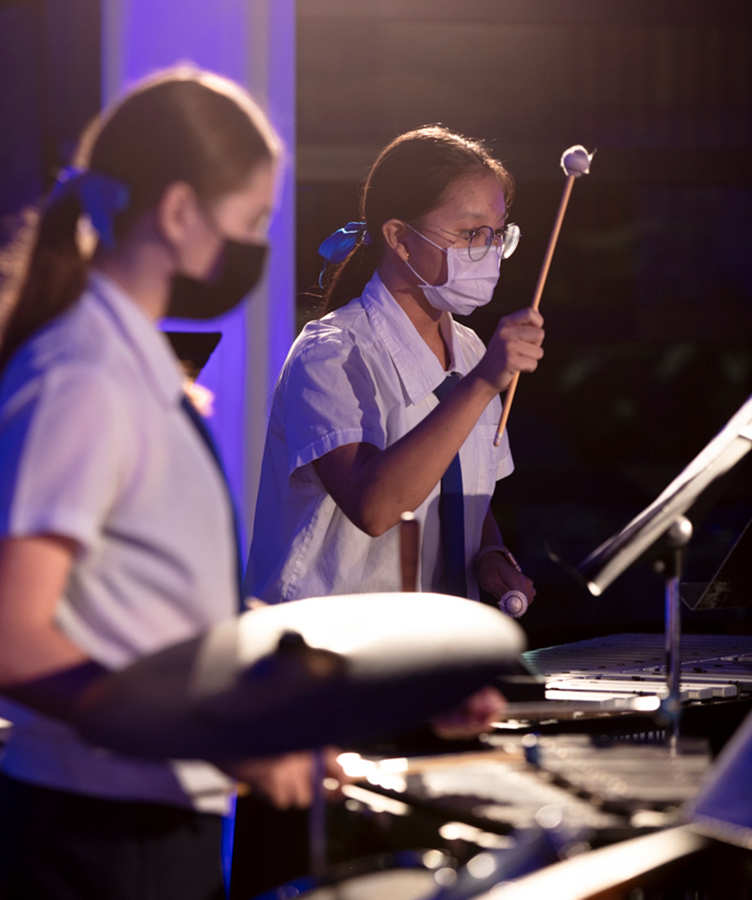
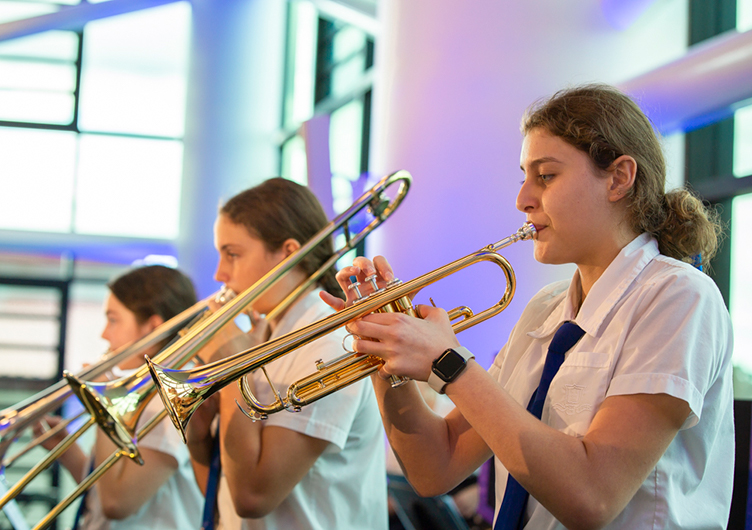
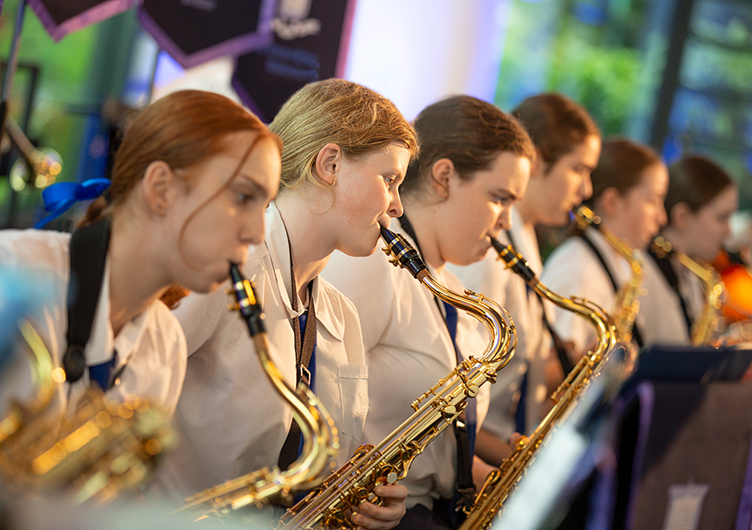
Autumn Strings Concert
We had to make the difficult decision to cancel our Autumn Strings Concert due to illness among our staff and students. It is disappointing to have to do this after all the hard work that has been put into the preparation for this concert—however, we are hopeful that we might be able to reschedule to a later date. Please stay tuned.
Viola Day
On Viola Day, our students were privileged to work with professional violist, Ms Alice Buckingham, from Camerata, Queensland’s Chamber Orchestra. Students participated in a series of workshops and masterclasses culminating in The Edmee Gainsford Viola Prize. All violists performed admirably, and we are so very proud of every student.
Thank you to our Strings staff who worked tirelessly to ensure this event could go ahead.
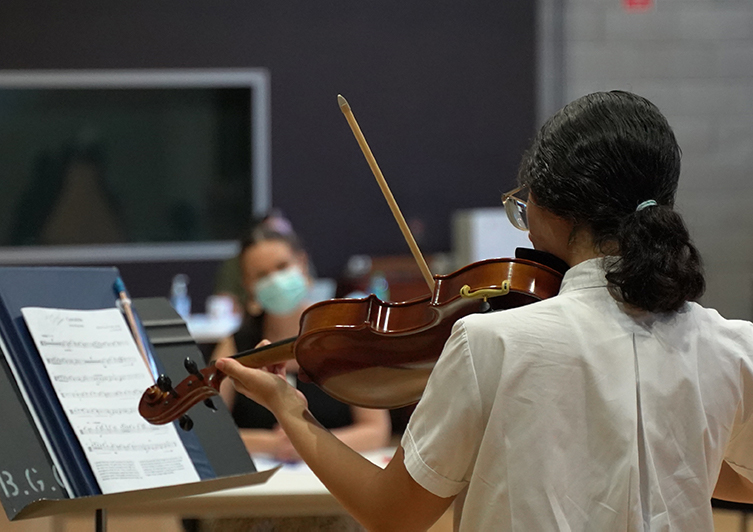
Instrumental Music competitions page update
Mrs Talluah Harper (Instrumental Music Administration Officer) has updated the Minerva competitions page. Students can now nominate via the page for competitions that have opened for enrolments.
School Hymn recording day
On Monday 28 March, Symphonic Winds, Chamber Singers, and Encore recorded our School Hymn with the technical expertise of CPC Production Services. Providing the Girls Grammar community with high-quality recordings of our official School musical items is a priority of the Instrumental Music department and we are so thankful for the support afforded to us by the School Senior Leadership Team to allow this to happen.


Student success
Last week, E Lyn Won (9B) successfully completed her AMusA exam on Cello. Completing the AmusA is a very demanding undertaking, and we are immensely proud of E Lyn’s wonderful achievement. The dedication, diligence, and musicianship that E Lyn has demonstrated is a credit to her, her teachers, and her supportive family. Congratulations, E Lyn!
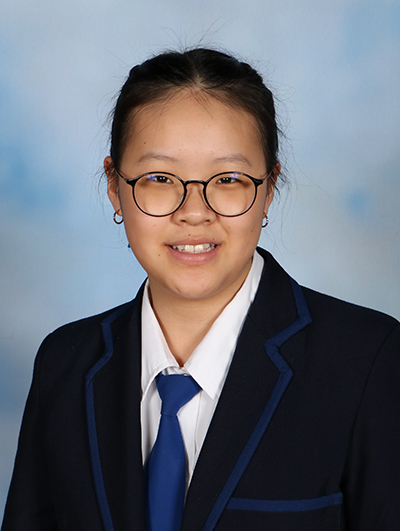
E Lyn Won (9B)
Recruitment drive
We are looking for students who might be interested in playing one of the rarer instruments in wind bands. We are looking specifically for students to play Tuba, Euphonium, and Bassoon. If you already play an instrument and are interested in the possibility of advancing through our ensemble structure quicker than you may do on your current instrument, we want to hear from you.
The ability to read, or willingness to learn to read, bass clef is a distinct advantage. The desire to be awesome is not negotiable.
If you would like to explore one of these instruments a little further, please contact Ms Porter aporter@bggs.qld.edu.au

What does good home practice look like?
In last week’s Music News article, we discussed the differences between lessons, rehearsals, and home practice. This week, we want to delve deeper into the element that encourages a student’s autonomy, self-determination, and empowerment—home practice.
Home practice is an individualised activity that can be highly subjective—what works for one person, may not work for another. However, there are characteristics of best practice that are common to most. Many students and parents/carers are interested in discovering what good quality practice looks like. The following points are some of the best ways to approach home practice.
- Consistency over cramming—with the correct approach, a student who practices consistently well for shorter periods of time across multiple days per week, will derive greater benefit than a student who does one large practice session per week. For example, practising 4-5 times per week for 15-20 minutes each time can give much greater benefit than one practice session of two hours duration. Consistent, good quality practice will always produce better results.
- Each practice session should be goal-oriented: What do I want to achieve from this practice? What tempo do I want to get this passage up to? I want to memorise my chromatic scale. I need to learn this tricky four-bar passage, etc.
- The space should be quiet and free from distraction or disruption and be an organised space. Do I have a music stand; a comfortable chair at an appropriate height; is there enough light; no television; do I have the appropriate access to technology (tuner, metronome, laptop, recording device, etc)?
- The student needs to be well-equipped: spare reeds or strings; maintenance items (oils, cleaning cloth, rosin, practice pad (percussion), drop cloth, music stand, etc). A well-equipped student is ready to take on the challenges that instrument practice can sometimes present to a young person.
- The level of concentration required for music performance/practice is quite extraordinary, so breaking practice sessions up into shorter intervals, with small breaks, is usually going to be more effective and less fatiguing. Setting a timer can be a little redundant but ensuring that appropriate breaks are factored into each session is very important. For example, if a student is going to practice for 30 minutes, it would be advisable to have two short breaks of a few minutes figured into that session.
- Practising is about mastering a challenging skill or technique, rather than simply ‘playing through the music’. Choose a tricky passage, a challenging scale, a skill that you find difficult, and focus on that one element. Then, once you can successfully play it, put the piece back together.
- Success is good—repeated success is even better. That is, once you have ‘got it right’, get it right again … and again … and again.
- Warming up is crucial. Not just for the muscles, but for cognitive purposes. Music performance often requires extremely detailed thinking across multiple hemispheres of the brain. Jumping straight into it can be difficult/frustrating. Additionally, musical instruments require the operation of fine motor skills that need time to coordinate. Teachers provide students with many and varied methods of warming up.
- Recording yourself is a fantastic method for self-evaluation. We are often our own most enthusiastic critics. But sometimes we miss errors/inconsistencies in the moment of performance that a recording will not miss. Also, a recording will not ‘sugar coat’ tone quality. Giving yourself an opportunity to hear what the audience hears is a powerful motivator.
- Practice isn’t always about playing your instrument. It can be reading about your instrument; reading musical notation; completing a musical quiz; watching a documentary on a famous musician who plays your instrument; doing rhythm workouts; memorising fingering patterns or technical work; doing physical workouts; researching the history of a piece, a composer, or your instrument.
- Remember that music practice can be fun, and sometimes the fun is in successfully overcoming a musical or technical difficulty that you’ve had in the past.
Home practice is where students solidify and make permanent the habits that they create themselves. It is in each student’s control what those habits are and what they look like. Your Instrumental Music teacher is always your best source of information regarding what is best for your musical progress.
Performance Week
Week 4, Term 2 is Performance Week—students have been covering repertoire for these performances over Term 1 and should be progressing through their work towards this goal. We anticipate that many students will be practising diligently over the holidays, putting the final touches on their music. Some of our more experienced musicians will be participating in the Prizes and Championships—these students are to self-nominate via the Instrumental Music competitions Minerva page.
MSG News
Thank you to everyone who has assisted us at music events during this term, even if you had to withdraw for isolation reasons or your event had to be cancelled at the last minute. We hope that our music staff, students, and families can enjoy the holiday break and that Term 2 brings some normality back to the program.
We look forward to seeing more new faces at our next meeting, which is in Week 1, Term 2—Thursday 21 April at 6 pm in the Band Room.
Please contact us at msgbggs@gmail.com if you have any questions.
Looking Ahead
- BGGS ANZAC Assembly—Wednesday 20 April
- MSG Meeting—Thursday 21 April at 6 pm (BGGS Band Room)




